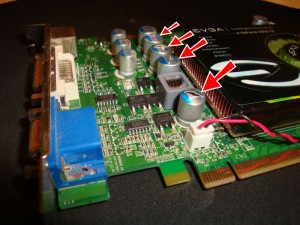How to Keep a Computer or Laptop Dust Free?
 Keeping a computer or laptop dust free is as much of a challenge as keeping weeds out of the garden. While this may sound next to impossible, there are some basic preventive measures the user can take to help keep the inside of a computer free of dust or at least keep it to a minimum. First let’s see what bad things dust does to a computer.
Keeping a computer or laptop dust free is as much of a challenge as keeping weeds out of the garden. While this may sound next to impossible, there are some basic preventive measures the user can take to help keep the inside of a computer free of dust or at least keep it to a minimum. First let’s see what bad things dust does to a computer.
• Clogs vents (fans, heat sinks, power supplies, etc.) which leads to over heating and eventually hardware failures.
• Dust can hold moisture, moisture can cause short circuits, which means you can say goodbye to the computer eventually.
• Laptops often overheat due to dust clogged in it’s CPU heat sink.
Where Does Dust or Foreign Objects Come From That Get Into a Computer?
• Plants
• Animal’s hair and dander
• Cigarette or Cigar Smoke
• Road Dust (Often from city traffic or if in the country, likely from farm fields)
• Sand (desert conditions)
• Factory by products such as metal shavings, wood particles, etc.
• Grease (just don’t have your computer in your family kitchen, period)
Example of what can happen to computer components as seen to the right is when vents get clogged, electronics will begin to overheat. A component can only take so much heat, so eventually something will have to give. Many times what gives will be capacitors. In the case of the picture to the right, this is a video card that overheated and capacitors began to pop. When they pop, they sound like .22 cal bullets being fired. This particular video card overheated due to common household dust being collected in its vents over a 2 year period. While it was a simple thing to replace the card, the electronic explosions can potentially cause data lose and of course loss in productivity when you can not use the computer until it is fixed. Problems such as this can intermittently work will having the blown capacitors for a little while, but eventually will lead to blue screens, boot failures, then eventually the system will not power on.
How do I keep my computer clean? There are a few preventive measures you can do before you dust out your system. RCCS has been to many different places with different environments. Some places are oddly clean to where the 5 year old computer that has never been opened and is completely clean to the opposite extreme where we thought we were going to be attacked by the particles.
Preventative Measures:
- Don’t expose your system to harsh environments like in the above list.
- Don’t smoke at or around the computer. Smoking is the worst for killing a computer prematurely.
- Keep the computer off the floor and preferably away from carpet or dust collecting areas.
- Keep the computer away from forced air heating or air conditioning.
- Install an air filter into or around the computer. Alternative a computer could be installed into a controlled environment (clean room, very expensive.)
- Keep animals away (Typically next to impossible with cats and dogs.)
- Easy way out: Air Purifier!
How often a computer is to be cleaned depends on your situation and environment. Some computers due to their harsh environments may need cleaned out weekly where others are every 6 months to a year. It really depends on your environment. A rule of thumb is if you see dust mounding around your exterior vents, power supply, and/or connections, then it is probably time to clean up the inside.
When cleaning out a computer it is best to use compress air to blow out the loose dust. Do this with the computer unplugged and powered off for at least 30 minutes. If the compressed air would to happen to blast freeze condensed air onto a hot chip it will crack it and destroy the electronics. Laptops must be cleaned from inside out as well. Do not think that blowing air into any computer will help, because it will not. It will only cause more room for new dust to build up. If you are not comfortable with cleaning the inside of your computer, then have a professional come and help you. Other forms of foreign substances such as cigarette smoke is very sticky and can not be just blown off. This will need to be removed with isopropyl rubbing alcohol by a technician unless you have been trained in doing so. Computer and electronics are sensitive to static electricity, so be sure you are grounded anytime you are going to be coming into contact with the insides of a computer.





